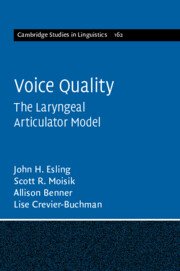Book contents
- Voice Quality
- Series page
- Cambridge Studies in Linguistics
- Voice Quality
- Copyright page
- Contents
- Figures
- Tables
- Preface
- Acknowledgements
- Abbreviations
- 1 Voice and Voice Quality
- 2 Laryngeal Voice Quality Classification
- 3 Instrumental Case Studies and Computational Simulations of Voice Quality
- 4 Linguistic, Paralinguistic, and Extralinguistic Illustrations of Voice Quality
- 5 Phonological Implications of Voice Quality Theory
- 6 Infant Acquisition of Speech and Voice Quality
- 7 Clinical Illustrations of Voice Quality
- 8 Laryngeal Articulation and Voice Quality in Sound Change, Language Ontogeny and Phylogeny
- References
- Author/Artist Index
- Subject Index
5 - Phonological Implications of Voice Quality Theory
Published online by Cambridge University Press: 21 June 2019
- Voice Quality
- Series page
- Cambridge Studies in Linguistics
- Voice Quality
- Copyright page
- Contents
- Figures
- Tables
- Preface
- Acknowledgements
- Abbreviations
- 1 Voice and Voice Quality
- 2 Laryngeal Voice Quality Classification
- 3 Instrumental Case Studies and Computational Simulations of Voice Quality
- 4 Linguistic, Paralinguistic, and Extralinguistic Illustrations of Voice Quality
- 5 Phonological Implications of Voice Quality Theory
- 6 Infant Acquisition of Speech and Voice Quality
- 7 Clinical Illustrations of Voice Quality
- 8 Laryngeal Articulation and Voice Quality in Sound Change, Language Ontogeny and Phylogeny
- References
- Author/Artist Index
- Subject Index
Summary
Chapter 5 explores the implications of the Laryngeal Articulator Model for phonology and the place of voice quality in phonological analysis. The Phonological Potentials Model (PPM) is explained, and synergistic and anti-synergistic relations are mapped in diagrams. Earlier phonological approaches that do not consider the laryngeal articulator are reviewed, while the PPM demonstrates how cooperative lingual-laryngeal activity can be accommodated in phonological analysis. Case studies of languages having lower-vocal-tract contrasts (vocal register, pharyngealization in click languages) give an idea of the network of articulatory relationships that form the grounding of phonological representations. We highlight vocalic-harmony (so-called [ATR]), syllabic, and tense–lax registers in West African, Northeast African and Southeast Asian languages. The case of Southern Wakashan pharyngeal genesis illustrates the role of voice quality in sound change.
Keywords
- Type
- Chapter
- Information
- Voice QualityThe Laryngeal Articulator Model, pp. 155 - 184Publisher: Cambridge University PressPrint publication year: 2019



